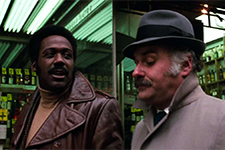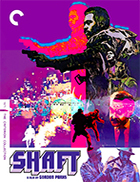Shaft (1971)
|  Virtually everything you need to know about Gordon Parks’s seminal action-thriller Shaft is embedded in its iconic opening scene. As Isaac Hayes’s Oscar-winning title song reverberates on the soundtrack with its thumping bass notes, wah-wah funk guitar chords, and deep-throated lyrics, the camera follows private detective John Shaft (Richard Roundtree) as he walks confidently down 42nd Street in New York City, stepping out in front of a car and giving the driver the finger when yelled at to get out of the road. With his assured stride and fashionable knee-length leather jacket and turtleneck sweater, Shaft is confidence incarnate. He owns the space around him and never waivers from what he is doing, which is what made him so different from Hollywood’s previous depictions of black characters, both positive and negative. As Theophilus Green wrote in an August 1972 article in Ebony magazine, Shaft is “a bad, black private detective, a dude who’s got his program all together and he knows it.” Or, as Donald Bogle described him in his book-length study of African-American cinema, “As Roundtree’s John Shaft—mellow but assertive and unintimidated by whites—bopped through those hot mean streets dressed in his cool leather, he looked to black audiences like a brother they had seen many times before but never on screen.” And make no mistake—there is great power in representation on-screen, and prior to Shaft, screens had been largely vacant of characters like John Shaft. Apart from Melvin Van Peebles gritty, independently produced Sweet Sweetback’s Baadassssss Song (1971), which had been released earlier that year, the only characters even remotely similar to Shaft had to be found in the race films of the 1930s and ’40s, whose meager budgets and limited distribution in the segregated world of black-only theaters meant that they had no chance of influencing the broader culture. Shaft changed all that, partially because, as a major studio production, it was decidedly in the mainstream. While some have charged that the film is fundamentally compromised because it was produced by a Hollywood studio (MGM) and was written and produced by white men, one could argue that its hybrid status—both revolutionary black film with unprecedented imagery of a strong black protagonist and Hollywood product clearly shaped to appeal to both black and white audiences—makes it all the more historically important in challenging racial boundaries. And one cannot discount the presence of director Gordon Parks behind the camera. Parks had previously made the semi-autobiographical The Learning Tree (1968), which Warner Bros. contracted him to write and direct, making him the first black director to helm a major American studio film (it should also be noted that he wrote the screenplay, composed the musical score, and also served as producer). A self-taught photographer, he had previously broken the color barrier by being the first black man to shoot pictures for Glamour and Vogue, as well as earned accolades for his photo essays for Life magazine. Thus, for Parks Shaft was not just a studio genre film with a racial twist; rather, it was part of a broader revolution in the representation of blacks in mainstream popular culture. All of this would be just academic if Shaft weren’t also a genuinely good movie, which it is. It is not a masterpiece by any stretch, but it a solid piece of genre craftsmanship, working the contours of the private detective film in ways both familiar and unique. Based on the 1970 novel by Ernst Tidyman, who co-wrote the screenplay with John D.F. Black, a veteran television scribe who had penned episodes of Mr. Novack, Laredo, and Star Trek, the film follows John Shaft as he becomes embroiled in a turf war between the organized crime syndicate in Harlem run by Bumpy Jonas (Moses Gunn) and the Italian Mafia. Bumpy hires Shaft to find his abducted daughter, which puts him squarely in the middle of a potential all-out war. Key to finding Bumpy’s daughter is a black revolutionary named Ben Buford (Christopher St. John), which means that Shaft must navigate his way through the fraught political realm of post-Civil Rights black nationalism. Meanwhile, he must also balance his cautious relationship with the New York police, particularly Detective Vic Anrozzi (Charles Cioffi), who needs information from Shaft. And this is part of what makes Shaft such a powerful and memorable character. Unlike everyone else on screen, he can navigate multiple worlds—black and white, legal and criminal, professional and domestic—with confidence and style. He remains unflappable throughout, whether he’s faced with angry cops, vicious Mafia goons, or ruthless crime lords, yet Roundtree keeps him somehow grounded. On paper, the character is a fantasy figure of black empowerment, but on screen he feels real, lived-in, approachable. Far from a cinematic cartoon, John Shaft is, as Donald Bogle put it, “a brother [black audiences] had seen many times before but never on screen.” It is all the more amazing, then, that Roundtree was cast in this pivotal role, given that all of his previous work has been in modeling and theater. Prior to embodying John Shaft, he had never been seen on a movie screen. But, Parks was insistent that Roundtree be cast, a choice that became central to the film’s success, along with the hiring of Isaac Hayes to write the indelible score that brilliantly merges R&B, funk, soul, and gospel. Parks and cinematographer Urs Furrer give the film a gritty, almost documentary-like vibe that captures the grime and gray of New York in winter. The ground-level authenticity immediately sets the film apart from so many other urban detective yarns, aligning it with the gritty verisimilitude of other New Hollywood films like William Friedkin’s The French Connection (1971), which, not incidentally, was also written by Tidyman. Shaft, of course, would go on to spawn a host of so-called blaxploitation films, which filled cinema screens throughout the early 1970s. And, while many of them are entertaining and colorful and revolutionary in their own right, Shaft will always stand apart as the progenitor, the one that broke so many molds and paved the way for future black representation on-screen.
Copyright © 2022 James Kendrick Thoughts? E-mail James Kendrick All images copyright © The Criterion Collection | |||||||||||||||||||||||||||||
Overall Rating: 

 (3)
(3)


